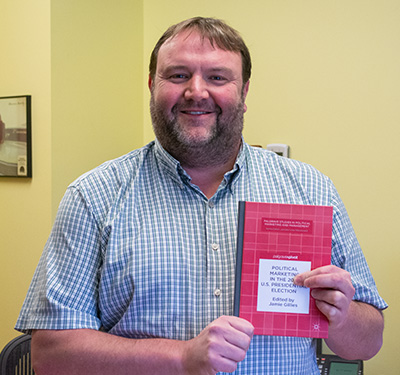
Dr. Jamie Gillies, professor and chair of the Department of Journalism and Communications, has published his newest book, Political Marketing in the 2020 U.S. Presidential Election. This book, which is a follow up to Gillies’ Political Marketing in the 2016 U.S. Presidential Election, focuses on the political marketing and branding strategies of presidential candidates Joe Biden and Donald Trump, with particular attention to how those strategies have changed since the 2016 election.
“What I’m looking for readers to take away is that we’re kind of, as political scientists, writing the first academic draft of history,” Gillies said.
While writing Political Marketing in the 2020 U.S. Presidential Election, Gillies was simultaneously teaching a special communications class on the 2020 election. He said in-class discussion helped him get ideas for the framing and focus of the book.
“It was almost like having a group of observers to talk about these issues, while you’re writing the book. That makes research so much easier because you can throw out discussion questions and the students can help frame what the themes should be, and I think that comes across in the introduction of this book.”
Gillies said he often uses elections as real-time case studies in the courses he teaches, examining political events through a marketing and communications lens.
“Because marketing and communications are so essential, using elections really goes beyond just the political elements. We can see where politicians get their ideas from, and the ways in which politicians and political strategists try and catch up with other sectors and use different communication skills.”
Gillies incorporates current events into every class he teaches. He said he thinks it is especially important to use current examples when teaching communications, because the industry, technology and how people use it changes so rapidly.
“Students need that linkage to things that are occurring in the world around them.”
Gillies hopes his book gives readers a sense of what the 2020 election was like in the moment, contrasting the immediate journalistic perspective with an early academic perspective that will precede more academic literature in the coming years.
“It is a unique little space in academic literature that I’m hoping to continue as a series after every US presidential election.”
-(2).jpg)
/filters:format(webp)/prod01/stuca/media/stu/site-assets/images/features/registration-news-box.png)
/filters:format(webp)/prod01/stuca/media/stu/site-assets/images/features/Sandra-Irving-Web-News-Box.jpg)
/filters:format(webp)/prod01/stuca/media/stu/site-assets/images/Intersession-and-Summer-Session_NewsItem.jpg)